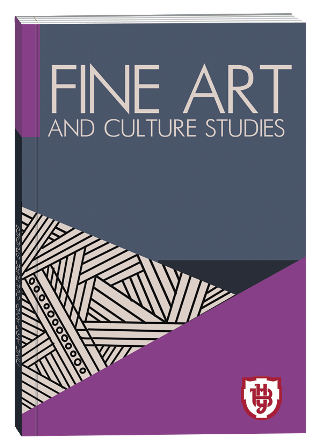THE ROLE OF MASTERING THE COMPOSITIONAL COMPONENT AS AN IMPORTANT COMPONENT OF THE DEVELOPMENT OF AESTHETIC AND ARTISTIC THINKING IN THE EDUCATION OF A MODERN POP AND JAZZ SINGER
DOI:
https://doi.org/10.32782/facs-2024-1-10Keywords:
compositional skills, solo vocalist, jazz, pop, learning trends.Abstract
Purpose: the work is aimed at considering the relevance of composing skills in the context of teaching pop and jazz performance as an additional incentive for the realization of creative embodiments of modern pop vocalists. This is an interesting educational trend that is intended to greatly enrich and expand the singer's qualitative indicators in terms of the content of performance, to raise the flexibility of musical and artistic thinking to a new level, to stimulate the growth of intellectual and aesthetic needs in the process of creative development and professional formation. Involvement in the fascinating process of composition contributes to the harmonious development of the applicant's personality, ability to convincingly formulate and express creative thought. Methodology: the study is based on a year-and-a-half observation of the performance and development dynamics of a group of students involved in music creation (composition), as well as the methods of music composition used by American composer and arranger William Russo and Jacques Perricone, one of the founders of the Department of Songwriting at Berklee College of Music, USA. Scientific novelty: In the context of rapid development and natural changes in trends in the modern pop music industry, the education of a vocalist as a reproduction tool is not enough. The value components of the artist's personality also play a significant role in contemporary music and performance. A singer focused only on the voice limits his or her individuality. The basics of compositional skills give impetus to the realization of new ideas of interpretation of the performed work, the ability to understand its drama, the introduction of personal vision, and freedom of artistic expression. These questions and ideas about the education of a modern pop and jazz vocalist are raised for the first time in contemporary Ukrainian musicology and considered in the national educational space, which is the scientific novelty of this work. Conclusions: The use of compositional practice in the process of educating a contemporary pop artist is an important element in the formation and development of a modern pop singer. It not only contributes to the overall development of musical abilities, but also helps to crystallize a unique artistic identity, which is a key concept for success in the modern musical environment. The ability to compose one's own songs/compositions allows pop singers to expand and supplement their repertoire with unique material, providing them with a competitive advantage. In addition, composing skills give the singer the opportunity to improvise and interpret musical material more freely, allowing them to create music that corresponds to personal feelings and experiences, thereby increasing critical thinking and their own artistic autonomy.
References
Давидов М. А. Виконавське музикознавство: энциклопед. довід. [посіб. для вищ. навч. закл.]. Київ: Нац. муз. акад. України ім. П. І. Чайковського, 2010. 406 с.
Симоненко В. С. Українська енциклопедія джазу. Київ : Центрмузінформ, 2004. 232 с.
Aebersold J. Play-A-Long, Jamey Aebersold Jazz, inc, USA, Vol. 1–100 (періодичне видання, серія посібників для імпровізаційної практики).
Bergonzi J. Inside Improvisation Series. Advance music GmbH, 2016. 230 p.
Collier J. L. The Making of Jazz: A Comprehensive History. Boston: Houghton Mifflin Harcourt Pub. 1987. 543 p.
Levine M. The Jazz Theory Book. Sher Music, 1995. 522 р.
Perricone J. Great Songwriting Techniques. Oxford Univercity Press, 2018. 398 р.
Russo W. Composing music: a new approach. University of Chicago Press; Reprinted edition, 1988. 193 р.
Stoloff B. Scat! Vocal Improvisation Techniques. Music Sales America, 1998. 130 р.
The Best Fake Book Ever: For Keyboard, Vocal, Guitar, and All "C" Instruments, 4th Edition. Hal Leonard pub. 802 p.
Сайт музичного коледжу Берклі: https://www.berklee.edu (дата звернення 10.02.2024)







